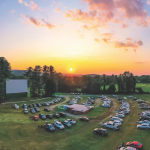The down-easter phrase, “You can’t get there from here,” is a familiar one to anyone who’s ever asked for directions on a back road in Maine. Unfortunately, it’s becoming more recognizable to touring music artists as well, in recent years, and it’s not exactly music to their ears.
The Visa Process — Complex and Stringent
American visa procedures have become significantly more complex and time-consuming in recent years, exacerbating a trend that began shortly after 9/11 and was codified by the passage of the Patriot Act legislation. In a recent article on the subject, the New York Times called them “labyrinthine, expensive and arbitrary,” and that’s using some of the nicer language that touring professionals have applied to them.
The net result of more stringent visa regulations and vetting for music artists has been a constriction of the highway into this country for gigs. Recently, a pair of overseas artists that had been scheduled to play at South by Southwest (SXSW) earlier this year had their visa applications denied. These denials, and the extended delays that are the equivalent of a denial in the time-sensitive touring business, are on the increase, even as the number of touring artists applying to come to the U.S. has steadily declined. According to Homeland Security Department records, requests for the standard foreign performer’s visas dropped by almost 25 percent between 2006 and 2010, the most recent fiscal year for which statistics are available. During the same period, however, the number of these visa petitions rejections rose by more than two-thirds.
A friend of mine, Nick Gold, owns Entertainment Travel in Nashville and has handled travel arrangements for major tours for more than 20 years. According to Nick, the situation is about as bad as it’s ever been in terms of the obstacles of getting work visas for music artists. “It’s pretty hard, whether you’re a musician or not, but it’s particularly difficult for musicians who want to perform in the States,” he says. Even once you’re in, you have to walk the line carefully; Gold cites one well-known artist who overstayed his work visa for a few extra days at the end of a tour. He was deported on arrival when the band showed up for their follow-on tour the next year.
Retaliations Brewing?
The situation has been happening long enough to have induced some negative feelings among artist communities. Perhaps more importantly, their governments can be keenly aware that music and other arts are a significant export that not only generate revenue from taxes paid by their musical nationals but whose performances around the world encourage tourism back to the home country. Gold says he’s heard rumors of retaliation from some in Europe — his single busiest destination for U.S. touring acts — but says nothing has come of it, at least yet.
But it’s already difficult in the emerging markets that will be important to the touring industry in coming years. The BRIC countries — Brazil, Russia, India and China — all have complex work-visa regulations. Some of these, such as in Brazil, have been amped up in retaliation for more stringent U.S. measures — not to mention their own domestic music industry that they want to protect.
Dealing with the Bureaucracy
The process for acquiring a valid work visa can be frustrating — applicants have to submit a substantial amount of paperwork to two giant government bureaucracies, the Department of Homeland Security and the State Department, and the latter will require an in-person interview at a U.S. embassy in their home country. And the process isn’t cheap — a standard work visa application costs $325 per person, including technical crew members. As part of its mandate to have the visa process be self-liquidating, Homeland Security has taken a leaf from the airlines’ playbooks and offers an expedited application option, for a “premium processing fee” of $1,225, to (hopefully) get the process completed within two weeks. This is an improvement over the official 90-day time window, although the process reportedly can still stretch to as long as six months. And even that rush premium might not be enough. In some cases, a key provision for work visas requires those performers’ contracts — and by extension, their gigs — must be in place before the visas can be approved. Then there are other impediments, ranging from union rules that require paid “consultations” for certain types of theatrical artists to assure they are not displacing jobs that should go to Americans, and the even less-predictable issue of what someone’s name sounds like and whether it can trigger no-fly-list scrutiny.
FOH Entry? Denied!
Tech crew members can be particularly vulnerable to these kinds of problems. Looking to make sure that inbound workers are not taking jobs away from Americans, visa vetters may be dimly aware of the uniqueness of music artists, but are even less so when it comes to their support personnel. And it might not be completely reasonable to expect a GS-7 to fully comprehend why one person might be better at mixing a particular artist than another, for the same reason that all those other GS-7s are rather interchangeable themselves, and they know it.
So I wasn’t surprised that the owner of a Los Angeles-area company that specializes in securing visas for touring artists told me that it’s not unusual for an FOH mixer to be denied entry, even when the rest of the band is admitted. That CEO, who preferred to remain anonymous, recommended that all technical talent do what the creative talents hire publicists to do: generate and collect third-party documentation that validates what you do and why you’re particularly good and unique at it, including articles and mentions in magazines like this one. And, as importantly, allow months — not weeks — to obtain your first-time-overseas work visa approvals.
Visa issues are collateral to the larger trend of globalization, and the fact that live music and performances have become both high-value and commoditized propositions (Blue Man groups are a perfect example of how one can be both). We’re not that far off from a time when Indian Desi artists and Shanghai rock bands will be on Live Nation’s radars. Humphrey Bogart’s character knew the importance of “letters of transit” at Rick’s Café Américain in Casablanca. That hasn’t changed. Get your papers in order.



